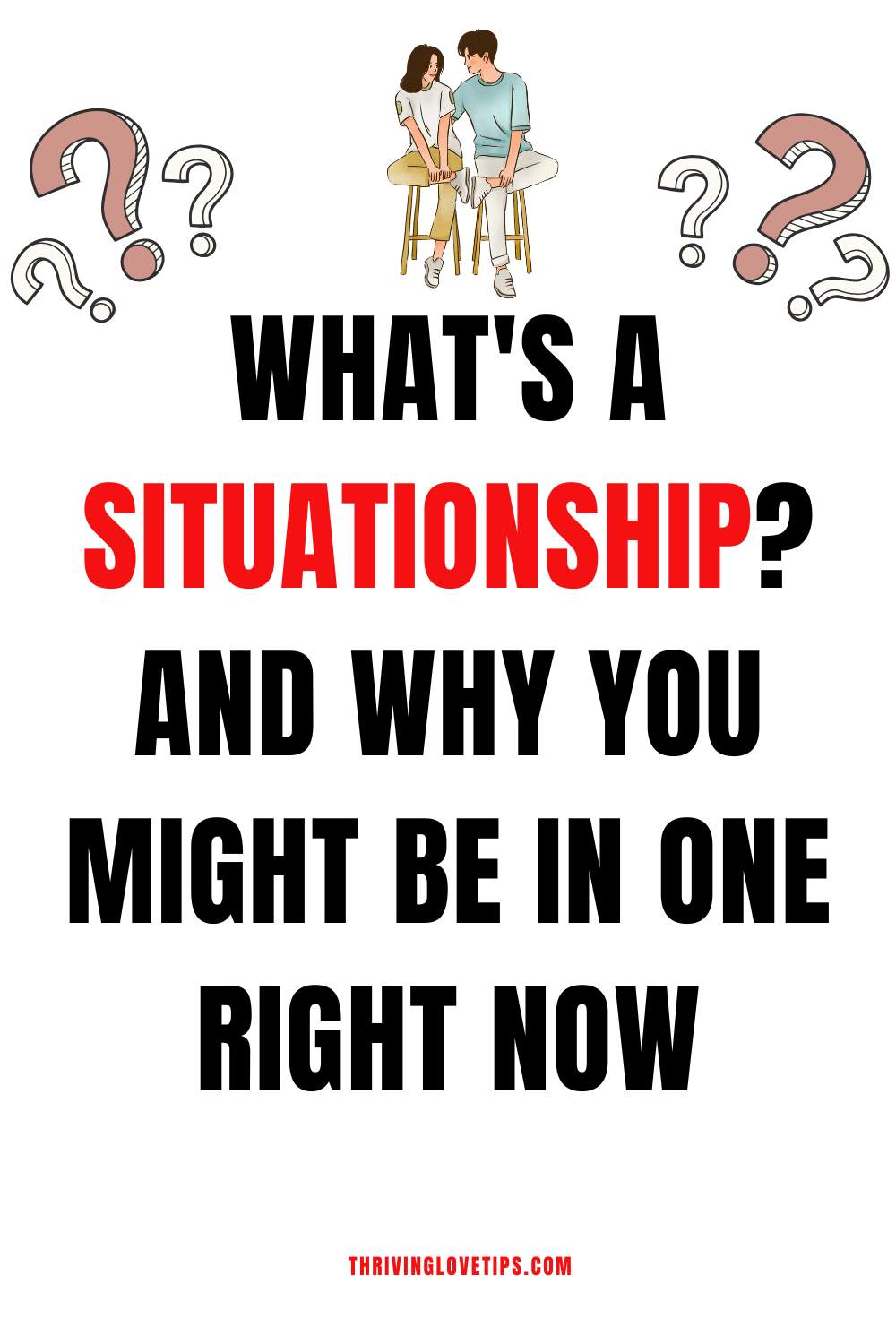You’re seeing someone. You text regularly, maybe even daily. You’ve slept together more than once. You know their coffee order and they know yours. But when your friend asks, “So, are you guys dating?” you freeze. Because honestly? You have no idea what to call this thing.
Welcome to the confusing, emotionally draining world of the situationship. It’s that frustrating space where you’re more than friends but not quite in a relationship. You’re doing couple things without actually being a couple. And if you’re reading this while simultaneously checking your phone to see if they texted back, there’s a good chance you’re in one right now.
I’ve watched friends get stuck in situationships for months, sometimes years. I’ve seen the anxiety it creates, the constant questioning, the mental gymnastics of trying to figure out where you stand. One of my closest friends spent nine months in what she called “relationship limbo” with a guy who would act like her boyfriend when they were together but introduce her as “just a friend” to anyone who asked. She was miserable but couldn’t seem to walk away.
The truth is, situationships have become incredibly common in modern dating culture. They’re not inherently bad, but they’re often emotionally complicated and rarely end well unless both people are genuinely on the same page about what they want. So let’s break down what situationships actually are, why they happen, and what to do if you find yourself in one.

Understanding What a Situationship Actually Is
A situationship is essentially a romantic or sexual relationship that exists without clear definition, commitment, or expectations about the future. You’re involved with someone in ways that feel relationship-like, but there’s been no conversation about what you actually are to each other.
According to family scientist Dr. Mickey Langlais, who researched situationships at Baylor University, “Situationships are romantic relationships that involve spending time together and engaging in physical and sexual activity, but there is no label and commitment is low.” His research found that people in situationships engage in similar physical and sexual behaviors as those in committed relationships, but satisfaction and commitment are significantly lower.
Psychologist Dr. Susan Albers from the Cleveland Clinic describes it as “the space between a committed relationship and something more than a friendship.” You’re in this gray zone where things feel romantic or sexual, but there’s no real discussion about what it all means or where it’s going.
Licensed clinical psychologist Holly Schiff adds that a situationship “generally involves all of the perks of a real relationship without the formal title and commitment.” You might be hanging out regularly, sharing intimate moments, even meeting each other’s friends, but when it comes to defining what you are, everything gets vague and uncomfortable.
The key distinction here is the lack of commitment and clarity. In a relationship, both people have usually had some version of “the talk” where you establish that you’re together, you’re exclusive, and you’re working toward a shared future. In a situationship, that conversation never happens, either because one person is avoiding it or both people are too scared to bring it up.
The Telltale Signs You’re in a Situationship
If you’re wondering whether what you have qualifies as a situationship, here are the signs that experts say are dead giveaways.
No Labels or DTR Conversation
You’ve never had a “define the relationship” talk. You don’t call each other boyfriend or girlfriend. When people ask what you are, you say something vague like “we’re hanging out” or “it’s casual” even though it doesn’t feel casual to you. The relationship exists in this undefined space because naming it would require commitment that one or both of you aren’t ready to give.
Inconsistent Communication
Psychologist Tzall notes that communication in situationships is often sporadic and unpredictable. “A partner may be inconsistent about their feelings and behavior, being warm and affectionate one minute, and cool and aloof the next. Communication can also be inconsistent, where one partner may be slow to respond to messages or avoid having serious conversations about the relationship.”
You never know when you’ll hear from them. Sometimes they’re texting you constantly, other times you don’t hear from them for days. They might be super affectionate when you’re together but distant when you’re apart. This inconsistency keeps you off-balance and constantly wondering where you stand.
No Future Planning
According to Tzall, “Planning anything for the next few months might be out of the question, as that would assume that the relationship is anything more than casual.” Conversations about the future feel off-limits. You make plans day by day or week by week, but talking about anything further out, like holidays or events months away, creates awkwardness.
When my friend was in her situationship, she couldn’t even get the guy to commit to plans more than a few days in advance. Meanwhile, he was planning a guys’ trip three months out. The message was clear: she wasn’t part of his future planning because she wasn’t actually his girlfriend.
You Haven’t Met Important People in Their Life
Tzall explains, “One partner may not feel the need to integrate the other person into their life. They may wish to keep the matters of their social life private.” In situationships, you’re rarely introduced to family or close friends. You might meet their roommates or people they run into randomly, but meeting the people who actually matter in their life? That would suggest this is serious, and serious is exactly what they’re avoiding.
Unclear Boundaries Around Exclusivity
You might assume you’re the only person they’re seeing, but you’ve never actually discussed it. Or maybe you know they’re on dating apps but you’re too afraid to ask if they’re actively using them. The lack of clear boundaries around exclusivity is classic situationship territory.
Dr. Albers notes that in situationships, “Partners may not have that conversation about exclusivity, or have decided to keep things casual” even when one person might want something more defined.
Physical Intimacy Without Emotional Depth
You’re physically close but emotionally distant. The physical affection might be abundant, but when it comes to meaningful conversations about feelings, dreams, or vulnerabilities, things stay surface level. You might share your bodies but not your deeper selves.
Why Situationships Happen
Understanding why situationships form can help you figure out whether you’re in one and what to do about it. There are several psychological and cultural factors at play.
Fear of Commitment
Psychologist Tzall explains, “Individuals with commitment issues may prefer to keep the relationship casual (i.e., avoid putting a label on it) out of fear that it will become too overwhelming.” For many people, the idea of a committed relationship feels scary. It means vulnerability, expectations, potential loss, responsibility. A situationship offers companionship and intimacy without those perceived risks.
Attachment theory provides additional insight here. People with avoidant attachment styles often prefer situationships because they offer intimacy without the pressure of commitment. Meanwhile, those with anxious attachment styles might find themselves stuck in situationships, desperately wanting more but afraid to ask for it.
The Modern Dating Landscape
Dating apps and hookup culture have fundamentally changed how people connect. Psychologist Dr. Ramani Durvasula notes that “situationships often mimic the features of a relationship without any security or commitment. This ambiguity can be emotionally damaging, especially for people who value clarity and consistency.”
Technology makes dating more accessible but also more disposable. There’s always another potential match just a swipe away. Why commit when you have endless options? This mindset creates a culture where people keep their options open indefinitely, leading to situationships that drag on for months.
Life Circumstances and Timing
Sometimes situationships happen because of practical circumstances. Career uncertainty, busy schedules, or being in a transitional life phase can make commitment feel like something you can’t afford right now. A situationship offers companionship without the full investment of time and energy that a serious relationship requires.
One person might genuinely not have space in their life for a relationship but still wants connection and intimacy. The problem arises when the other person wants more but accepts the situationship hoping it will eventually evolve.
Protection from Rejection
By never defining things, you protect yourself from the pain of official rejection. If you don’t ask “what are we?” you can’t hear “I don’t want a relationship with you.” The ambiguity feels safer than the vulnerability of putting yourself out there and potentially being turned down.
Genuine Uncertainty
Sometimes people enter situationships because they’re genuinely unsure what they want. They like the person enough to keep seeing them but aren’t sure if it’s long-term material. The situationship becomes a holding pattern while they figure it out, though this “figuring it out” phase can stretch on indefinitely.
The Emotional Toll of Situationships
Here’s what many people don’t realize until they’re deep in one: situationships can be really hard on your mental health and self-esteem, especially if you’re the person who wants more.
Dr. Albers explains the neurological challenge: “We’re human. And when we’re intimate with someone, our brains release a hormone called oxytocin. It’s very hard to override hormones like oxytocin with the logic that we’re not attached to someone.” Oxytocin facilitates bonding, trust, and attachment. Your brain is literally wiring you to connect deeply with someone while the relationship structure is telling you to stay detached. That’s a recipe for emotional confusion.
Tzall warns about the impact on self-worth: “Feelings of insecurity, loneliness and rejection can crop up, and the lack of clear boundaries can make it difficult to establish trust. Self-worth can be greatly impacted when this person begins to feel that they are not worth any type of relationship or love. This can all lead to low self-esteem.”
When you’re in a situationship, you often find yourself constantly analyzing every text, every interaction, every mood shift, trying to figure out where you stand. This mental and emotional labor is exhausting. You’re putting energy into decoding signals instead of just enjoying a clear, defined connection.
The ambiguity creates anxiety. You don’t know if you should make plans because you don’t know if they’ll still be around. You can’t fully relax into the connection because you’re never quite sure if they’re as invested as you are. One client described it perfectly: “It’s like being hungry and someone keeps giving you snacks instead of a meal. You’re not starving, but you’re never satisfied either.”
Can a Situationship Turn Into a Real Relationship?
The question everyone in a situationship asks: can this turn into something real? The honest answer is: sometimes, but not usually, and not without intentional action.
For a situationship to evolve into a committed relationship, both people need to want that evolution. If you want more but they’re perfectly happy with the current arrangement, it’s probably not going to change. People don’t suddenly wake up one day and decide they’re ready for commitment if they’ve been actively avoiding it.
That said, sometimes situationships exist because of fear or uncertainty that can be worked through. If both people are open to having honest conversations about what they want and what’s holding them back, there’s potential for growth.
The key is direct communication. You have to be willing to have “the talk” even though it’s scary. You have to be willing to ask for what you want and accept the answer, whatever it is. And you have to be willing to walk away if the answer is that they’re not interested in giving you what you need.
What to Do If You’re in a Situationship
If you’ve realized you’re in a situationship, here’s how to navigate it.
Get Clear on What You Actually Want
Before you can have a conversation with them, you need to have one with yourself. Are you genuinely okay with the current dynamic, or are you just tolerating it hoping it will change? Do you want a committed relationship, or are you also afraid of labels? Be honest with yourself about your needs and desires.
Dr. Albers advises checking in with yourself: “Are you okay with the current dynamic? Are you hoping it will evolve into something more? Do you feel emotionally nourished or emotionally depleted?” Your answers to these questions should guide your next steps.
Have the Conversation
If you want more clarity or more commitment, you have to ask for it. I know this is terrifying. The conversation might end the situationship. But here’s the thing: if asking for clarity ends it, that’s information you need. It means they were never going to give you what you want, and you were wasting your time hoping they would.
Approach the conversation calmly and directly. “I’ve really enjoyed spending time with you, and I’m at a point where I need more clarity about where this is going. What are you looking for?” Pay attention to their response. If they give you evasion, vague answers, or resistance to defining things, that’s your answer. They’re not interested in commitment with you.
Set Boundaries Based on Their Response
If they say they want to keep things casual and you want more, you have a decision to make. You can accept the situationship for what it is and genuinely be okay with it. Or you can recognize that it’s not meeting your needs and walk away.
What you can’t do is stay hoping they’ll change their mind. People show you who they are and what they want through their actions. Believe them. If they wanted a relationship with you, they would be in one with you.
Be Willing to Walk Away
This is the hardest part. Walking away from someone you have feelings for, even when they’re not giving you what you need, requires strength. But staying in a situationship that’s making you unhappy while hoping it will magically transform into a relationship is just prolonging your pain.
Therapist Dr. Ramani Durvasula emphasizes that “situationships often mimic the features of a relationship without any security or commitment. This ambiguity can be emotionally damaging.” If the ambiguity is hurting you, leaving is an act of self-respect.
When Situationships Actually Work
I want to be clear: situationships aren’t always bad. They can work under specific circumstances.
They work when both people genuinely want the same thing. If you’re both looking for something casual, enjoying each other’s company without the pressure of commitment, and neither person is secretly hoping for more, a situationship can be perfectly fine.
They work when they’re temporary and acknowledged as such. Maybe you’re both in transitional life phases, you know this isn’t long-term, and you’re enjoying the connection for what it is right now. As long as both people are on the same page, that’s okay.
They work when clear boundaries exist even without the label. Some people have situationships where they’ve discussed exclusivity, expectations, and how they’ll handle things even though they’re not using relationship labels. If you’ve had those conversations and both people feel secure, the lack of a label might not matter.
The problem is that most situationships don’t fit these criteria. Usually, one person wants more, or the lack of clarity creates anxiety and insecurity, or one person is using the situationship as a placeholder until something better comes along.
Read also Dating vs Relationship: When Did We Actually Become a Couple?
Moving Forward
Whether you decide to stay in your situationship, try to transform it into a relationship, or walk away, the most important thing is honoring your own needs. You deserve clarity. You deserve someone who’s excited to be with you and isn’t afraid to claim you. You deserve a connection where you feel secure, not one where you’re constantly anxious about where you stand.
Situationships exist in a gray area, and gray areas are exhausting to live in long-term. At some point, you have to decide whether you’re willing to keep living in uncertainty or whether you need something more defined.
As bell hooks wrote, “When we choose to love, we choose to move against fear, against alienation and separation.” Real love requires courage. It requires honesty. It requires the vulnerability of showing up fully and asking for what you want.
If the person you’re in a situationship with can’t or won’t meet you there, that tells you something important. And while it might hurt to accept that truth, accepting it frees you to find someone who can give you the clarity, commitment, and security you deserve.
You’re not asking for too much by wanting a defined relationship. You’re not being needy or demanding. You’re simply recognizing your worth and refusing to settle for crumbs when you deserve the whole meal.




